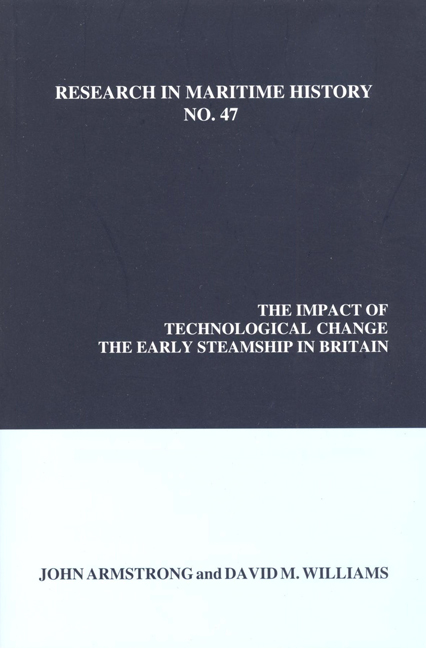Book contents
- Frontmatter
- Contents
- Series Editor's Foreword
- About the Authors
- Introduction
- Chapter 1 British Steam Navigation, 1812 to the 1850s: A Bibliographical and Historiographical Review
- Chapter 2 Some Official Listings of “Vessels Navigated by Steam” in Britain up to 1851: Evidence and Interpretation
- Chapter 3 The Steamboat, Safety and the State: Government Reaction to New Technology in a Period of Laissez-Faire
- Chapter 4 The Steamboat and Popular Tourism
- Chapter 5 The Thames and Recreation, 1815-1840
- Chapter 6 Steam Shipping and the Beginnings of Overseas Tourism: British Travel to North Western Europe, 1820-1850
- Chapter 7 Technological Advance and Innovation: The Diffusion of the Early Steamship in the United Kingdom, 1812-1834
- Chapter 8 The Steamship as an Agent of Modernisation, 1812-1840
- Chapter 9 “A New and Very Modern Business:” The Traffic and Operations of the Early Steamship
- Chapter 10 Promotion, Speculation and Their Outcome: The “Steamship Mania” of 1824-1825
- Chapter 11 The Perception and Understanding of New Technology: A Failed Attempt to Establish Transatlantic Steamship Liner Services, 1824-1828
- Chapter 12 The “Norwich Explosion” of 1817: A Local Tragedy of National Significance
- Chapter 13 Early Steamboat Services and Their Impact in North Wales, 1817-1840s
- Chapter 14 The Beginnings of a New Technology: The Constructors of Early Steamboats, 1812-1822
Chapter 13 - Early Steamboat Services and Their Impact in North Wales, 1817-1840s
- Frontmatter
- Contents
- Series Editor's Foreword
- About the Authors
- Introduction
- Chapter 1 British Steam Navigation, 1812 to the 1850s: A Bibliographical and Historiographical Review
- Chapter 2 Some Official Listings of “Vessels Navigated by Steam” in Britain up to 1851: Evidence and Interpretation
- Chapter 3 The Steamboat, Safety and the State: Government Reaction to New Technology in a Period of Laissez-Faire
- Chapter 4 The Steamboat and Popular Tourism
- Chapter 5 The Thames and Recreation, 1815-1840
- Chapter 6 Steam Shipping and the Beginnings of Overseas Tourism: British Travel to North Western Europe, 1820-1850
- Chapter 7 Technological Advance and Innovation: The Diffusion of the Early Steamship in the United Kingdom, 1812-1834
- Chapter 8 The Steamship as an Agent of Modernisation, 1812-1840
- Chapter 9 “A New and Very Modern Business:” The Traffic and Operations of the Early Steamship
- Chapter 10 Promotion, Speculation and Their Outcome: The “Steamship Mania” of 1824-1825
- Chapter 11 The Perception and Understanding of New Technology: A Failed Attempt to Establish Transatlantic Steamship Liner Services, 1824-1828
- Chapter 12 The “Norwich Explosion” of 1817: A Local Tragedy of National Significance
- Chapter 13 Early Steamboat Services and Their Impact in North Wales, 1817-1840s
- Chapter 14 The Beginnings of a New Technology: The Constructors of Early Steamboats, 1812-1822
Summary
This study aims to provide an overall account of the early steamboat, and more especially its impact, in the North Wales context. The emphasis is on “overall” for, to our knowledge, while considerable research has been undertaken, there has been no attempt to draw this together in a unified fashion. Such studies as do exist are somewhat dated and certainly limited in their coverage of the early steamboat. Frank C. Thornley's admirable Past and Present Steamers of North Wales was published in 1952. This, however, offers only a chapter of four pages on “the Early Steamers” - taking the story up to the 1840s - and another of similar length on the tragedy of Rothsay Castle of 1831. Thornley's prime concern was very much on the second half of the nineteenth century. The same is true of a later study, that of Roy Fenton, in a paper on North and mid-Wales steamers, that appeared in Maritime Wales some twenty years ago. He offered “A Chronological survey” of steamboat services but covered the steamboat's first three decades in a single paragraph before embarking on a detailed survey of operators and services post-1850. Fenton, moreover, describes the period 1856-1873 as “Pioneering Years,” which implies that little of consequence had preceded mid-century. This is to underestimate the level of activity in Welsh waters during the early decades of the steamboat and the impact of what was a revolutionary technological advance.
Since these studies, much has been written that serves to enhance our appreciation of the early steamboat. There has been work focussing on the technology and economics of early steam and its revolutionary impact; additionally, and of special relevance, in the late 1980s and 1990s a generation of scholars produced a range of books and papers in the field of North Wales maritime and port history. Also, in a nearby local context, early Irish Sea steam shipping has been the subject of new and highly perceptive research. Apart from its geographical proximity, Ireland was especially significant in the development of steam navigation. Steamboat operation was a relatively costly business. Ireland's different legal system made it easier to promote and capitalize joint-stock companies; hence, Irish companies were to the fore in the pioneering of steamboat services. The present authors draw on all this wealth of fresh material.
- Type
- Chapter
- Information
- The Impact of Technological ChangeThe Early Steamship In Britain, pp. 259 - 276Publisher: Liverpool University PressPrint publication year: 2011



